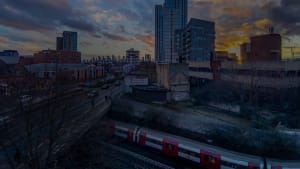Coronavirus; what role will infrastructure play in our economic recovery?
Creating Opportunity for Everyone
The coronavirus crisis has seen roads emptied, flights grounded, and railways partially nationalised. To discuss the future of our transport network and how investment in infrastructure will help our economy recover, James Banks, host of AECOM’s Talking Infrastructure series, spoke to representatives from the HS2 high-speed rail project and the government agencies in charge of our roads and rail network, Highways England and Network Rail.
In a wide-ranging discussion, AECOM’s Managing Director of Civil Infrastructure Mark Southwell was joined by Mark Thurston, CEO of HS2, Dean Sporn, Director of the Regional Investment Programme (South) for Highways England, and Nick King, Group Director, Network Services, Network Rail.
Mark Southwell “There’s never been a better time for the government to really push hard on infrastructure investment, to really get the economy back on track. History has told it’s the right thing to do.”
Mark’s “biggest concern” is a potential lag in investment. Adding “The budget has been identified, we need to get it into the supply chain and working through the economy.
Mark Thurston argued for the private sector to play a role. “As we come out the other side of this, I’d like to think that we will be much smarter in the public sector at using the private sector and getting them engaged quicker,” he said. “All of us in the infrastructure sector have an obligation to find ways of funding projects. We shouldn’t rely on government’s cheque book indefinitely.”
Nick King said Network Rail has had to learn how to be smart and agile in its decision making, introducing timetables changes within days that usually take months and years to plan. This is likely to continue as the lockdown eases because social distancing “changes the concept of everything you do in a station.”
He also said that the demands of the current crisis shouldn’t make us forget the climate emergency, urging the industry “to hold our nerve and absolutely remember that we will continue to have these challenges in the future and use this crisis to start to accelerate some of the other schemes that have an economic benefit as well as delivering a great environmental outcome.”
Dean Sporn said “people have been very, very surprised by how quickly places have repaired themselves” and “we should take these lessons” from this to push forward the sustainability agenda.
-
ArticleFuture
![]()
The Future is Now
Infrastructure's role in economic recovery
The global community has been badly shaken, but already, there is a determination to emerge from this stronger: to rethink how we do things and reboot.The Future is NowThe global community has been badly shaken, but already, there is a determination to emerge from this stronger: to rethink how we do things and reboot. -
ArticleFuture
![]()
Monuments to trying times
Stimulus investments that are still paying dividends
Stimulus spending is an opportunity to fix inadequate infrastructure, transforming communities for decades to come.Monuments to trying timesStimulus spending is an opportunity to fix inadequate infrastructure, transforming communities for decades to come. -
ArticleSocial, Future
![]()
Social impact: Building a better case for infrastructure Investment
Measuring social impact
As we look towards recovery, there’s a danger that economic concerns dominate infrastructure decisions. To support those most hurt by coronavirus, social impact should be a key driver for investment.Social impact: Building a better case for infrastructure InvestmentAs we look towards recovery, there’s a danger that economic concerns dominate infrastructure decisions. To support those most hurt by coronavirus, social impact should be a key driver for investment.






